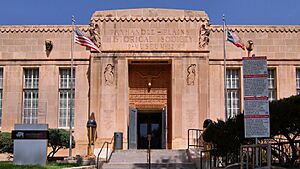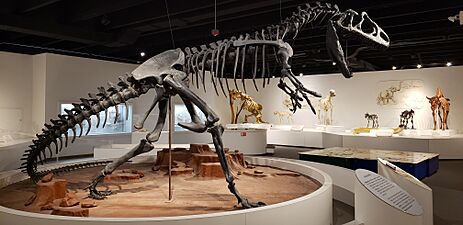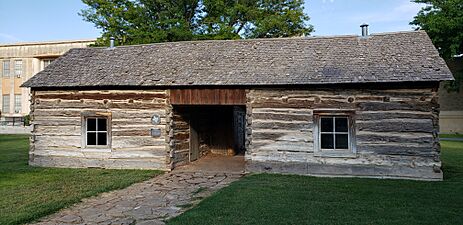Panhandle–Plains Historical Museum facts for kids
The Panhandle–Plains Historical Museum is a cool history museum. It's located in Canyon, Texas, right on the campus of West Texas A&M University. Canyon is a small city south of Amarillo.
The museum's amazing collection belongs to the Panhandle-Plains Historical Society. West Texas A&M University and the Texas A&M University Board of Regents help maintain the buildings. This museum is the largest history museum in Texas! It welcomes about 55,000 visitors each year and has over three million artifacts.
Contents
What You Can See at the Museum
The museum has many interesting things to explore. You can learn about life in the American West. There are exhibits on farming and ranching history. You'll also find art, old fossils, and rocks.
Discovering the Past
The museum shows how Native American people lived. You can see their art and tools. There are also old firearms and antique vehicles. You can even see fancy furniture and textiles. The museum also has items from the petroleum (oil) industry.
Pioneer Town
One special part of the museum is the outdoor Pioneer Town. It's like stepping back in time! You can see a livery (where horses were kept). There's also a saloon, a schoolhouse, and a pioneer cabin. These buildings show what a small town in the Texas Panhandle looked like in the early 1900s.
History of the Museum
The Panhandle-Plains Historical Society started in 1921. Teachers and students from West Texas State Teachers College helped create it. They wanted to save the history of pioneer life and nature in West Texas.
Opening and Growth
The museum got financial help for the 1936 Texas Centennial celebration. It officially opened in its current building on April 14, 1933. A famous historian named Angie Debo worked as a curator here from 1933 to 1934. In 2001, the museum had a big renovation. This project cost $5.8 million to make it even better.
Popular Exhibits to Explore
The museum has several exciting permanent exhibits. They help you understand the history of the region.
- People of the Plains: Experiments in Living: This exhibit shows how people lived in the Southern Plains long ago. It also compares their lives to how people live today.
- Pioneer Town: This is a fun recreation of a small settlement. It shows what life was like in the Texas Panhandle in the early 1900s.
- The Don D. Harrington Petroleum Wing: This exhibit has two floors! It tells the story of the Texas Panhandle's oil boom. This happened in the 1920s and 1930s.
- The T-Anchor Ranch House: This exhibit is outside the main museum building. It's a recreation of an original ranch house. The first house was built in the late 1870s.
Gallery
See also
 | Selma Burke |
 | Pauline Powell Burns |
 | Frederick J. Brown |
 | Robert Blackburn |





